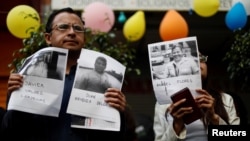It is “a gravely difficult and dangerous operating environment for journalists across the world,” U.S. Under Secretary of State for Civilian Security, Democracy, and Human Rights Uzra Zeya noted at the recent Global Conference for Media Freedom in Tallinn, Estonia.
The danger Under Secretary Zeya spoke of was evident soon after. Heber Lopez Vasquez, who was reporting on corruption among local officials, was murdered in Mexico on February 10.
Censorship, intimidation, imprisonment, and the closing of outlets for independent journalists around the globe also continue. Twenty-one countries from the Media Freedom Coalition recently expressed “deep concern” over Hong Kong and mainland PRC authorities’ attacks on independent media.
U.S. Secretary of State Antony Blinken noted from 2016-2021, approximately 85 percent of the global population saw press freedom decline in their country. That, he said, is “more than a statistic – it’s a blaring alarm.”
“Press freedom is indispensable for keeping people informed, allowing them to hold their governments accountable, and bringing to the surface critical issues that otherwise may not get public attention. We also know what happens without a free press: corruption flourishes; unscrupulous leaders abuse their power; and people’s voices are silenced.”
Secretary Blinken said democracies must lead to protect media freedom online and offline. The United States launched several initiatives during the Summit for Democracy, such as the new Journalist Protection Program to give reporters assistance, including legal aid and training in digital and physical security. Another new initiative combats gender-based online harassment and abuse.
The United States is also addressing the misuse of technologies to target journalists. Through the new Summit for Democracy Export Control and Human Rights Initiative, the United States, along with several other countries, is developing a voluntary code of conduct to use export controls to address the proliferation of technologies that can be used to abuse journalists and repress dissidents.
Additionally, the Secretary highlighted the recommendations of the High-Level Panel of Legal Experts on Media Freedom, which advises the Media Freedom Coalition and its partners on how to respond when journalists are targeted, and includes the recommendation of sanctions actions, similar to those the United States applied after the murder of journalist Jamal Khashoggi.
Secretary Blinken made clear that the United States will continue to support access to information and defend press freedom around the world.






